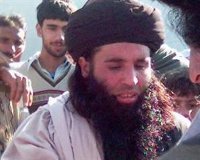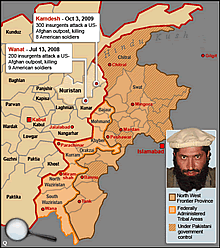|
|
|
Mullah Qari Fazlullah. |
A large Taliban force under the command of a wanted Pakistani leader attacked Afghan police in the northeastern province, sparking clashes that lasted for hours.
An estimated 300 Taliban fighters, reportedly under the command of Swat Taliban leader Mullah Qari Fazlullah, launched an assault today on a district center in Barg-e-Matal in the province of Nuristan, which borders Pakistan to the east. The outnumbered Afghan police held off the attack, killing seven Taliban fighters and suffering the deaths of two of their own officers.
The police called for reinforcements from Kabul but they did not arrive in time to fight the battle, according to the BBC. “There are many fewer police than attackers but we have the locals helping us,” the provincial chief of police said.
The Barg-e-Matal district is a known Taliban transit area to and from the northern Pakistani district of Chitral. Last summer, the Taliban took control of Barg-e-Matal for several months after a similar attack. US and Afghan forces were deployed to the region to help local Nuristanis eject the Taliban, but the forces later withdrew.
Barg-e-Matal borders the district of Kamdish, which is under Taliban control since US forces withdrew from combat outposts last fall after an attack by a large Taliban and al Qaeda force.
Taliban commander Qari Ziaur Rahman, who operates on both sides of the Afghan and Pakistani border, said that the US pullout from Kamdish and the Korengal Valley in neighboring Kunar province has given the Taliban greater freedom of movement on both sides of the border.
Fazlullah’s forces are thought to have moved into Nuristan last fall to evade a Pakistani military offensive that began in May 2009 and targeted him and the leadership of the Swat Taliban. In a phone call to the media late last year, he claimed he was in Afghanistan.
Fazlullah controlled the Pakistani district of Swat for more than two years after the government signed multiple peace agreements that helped him consolidate his power. His forces have survived last year’s Pakistani military offensive and have re-infiltrated Swat to wage a low-intensity insurgency that consists of targeted assassinations of pro-government tribal leaders and politicians.
The Pakistani military has claimed it killed Fazlullah, Rahman, and other top Taliban leaders in airstrikes and raids over the past year, but the Taliban leaders have eventually granted interviews with the media and mocked Pakistani officials.










5 Comments
Now being reported that Fazlullah was one of the seven killed.
This time round the reports are from Afghan police. I’m more inclined to believe them than the Pakistanis for obvious reasons. But, lets wait for some gory pictures or a Taliban admission.
http://timesofindia.indiatimes.com/world/south-asia/Pak-Taliban-leader-Maulvi-Fazlullah-killed-Afghan-police/articleshow/5980825.cms
If true, Pakistan will need to write an IOU to the Afghans. Good show by Afghan security regardless.
The NYT is reporting Fazlullah’s death at the hands of the Afghan police. If so, they deserve a lot of credit for being able to stand on their own against a large force of Taliban fighters. It seems that the locals helped them in the battle, too; more good news.
Could someone out there in LWJ Land please explain to me why pulling out of the Korengal Valley was a good idea. I know that we had taken casualties and that a new counterinsurgency strategy, small outposts in more populated areas, was being started plus the locals just did not like us to the point of xenophobia. Additionally, terrain was against us because the bases were in a valley. With that said I now come to a fundamental point of military strategy: block enemy supply routes. A rule as old as time. The value is self evident. The Talib seem to know this rule because they are hitting our supply lines in Pakistan. What ever the tactical strategy du jour is, strategic needs such as supply stay the same.
At the human level, I do not like to see 19 year old kids coming home in boxes. The idea of cutting Talib supply lines is to prevent IEDs or rockets from being brought in from Pakistan and thus preventing mass casualties.
Afghan Police have un-corroborated intel of the death of Mullah Qari Fazlullah
http://www.nytimes.com/2010/05/28/world/asia/28afghan.html?ref=world
Nic,
The stated logic was to use our troops to protect the most populated and most vital areas. This logic considers the outposts in Nuristan and the Korengal Valley as low priority.